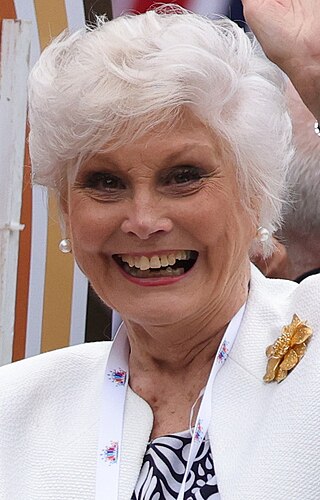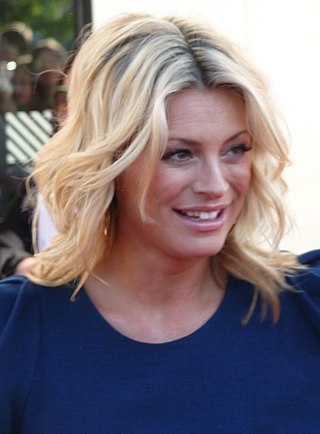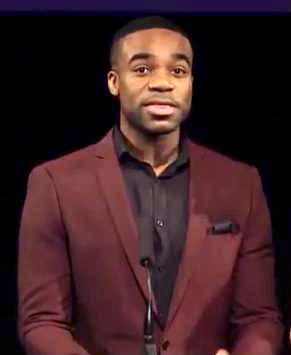Related Research Articles

Zoe Louise Ball is a British broadcaster and presenter. She was the first female host of the Radio 1 and Radio 2 breakfast shows for the BBC, and presented the 1990s children's show Live & Kicking, alongside Jamie Theakston from 1996–1999.

Angela May Rippon is an English television journalist, newsreader, writer and presenter.

Claudia Anne Irena Winkleman is an English television and radio presenter, writer, and journalist. She has presented various television shows for BBC, including Strictly Come Dancing (2010–present), and The Traitors (2022–present). She also hosts the Saturday mid-mornings show on BBC Radio 2, but is due to leave in April 2024.

Helen Elizabeth "Tess" Daly is an English television presenter. After beginning her career as a model, she ventured into television presenting and has co-presented the BBC One celebrity dancing show Strictly Come Dancing since 2004.

Strictly Come Dancing is a British dance contest show in which celebrities partner with professional dancers to compete in mainly ballroom and Latin dance. Each couple is scored by a panel of judges. The title of the show is a continuation of the long-running series Come Dancing. The format has been exported to 60 other countries under the title Dancing with the Stars, licensed by BBC Worldwide, and led to a modern dance-themed spin-off Strictly Dance Fever. The Guinness World Records named Strictly as the world's most successful reality television format in 2010. The series is currently presented by Tess Daly and Claudia Winkleman. Bruce Forsyth co-presented the series with Daly until 2014.

Ian Waite is a British professional dancer specialising in Latin American dance, a teacher and choreographer.

Anthony Paul Beke, known professionally as Anton Du Beke, is a British ballroom and Latin dancer, author and television presenter, best known for being a professional dancer and a judge on the BBC One celebrity dancing show Strictly Come Dancing. His professional dance partner since 1997 has been Erin Boag.

Strictly Come Dancing: It Takes Two is a British television programme, the companion show to the popular BBC One programme Strictly Come Dancing. First aired on 25 October 2004, it is broadcast from Monday to Friday during the run of the main show on BBC Two at 6:30 pm.
Strictly Come Dancing returned for its fifth series on 29 September 2007 on BBC One. Bruce Forsyth and Tess Daly returned as co-presenters of the main show on BBC One, while Claudia Winkleman returned to present spin-off show Strictly Come Dancing: It Takes Two on BBC Two. Len Goodman, Arlene Phillips, Craig Revel Horwood, and Bruno Tonioli returned to the judging panel.

Aleksandra 'Ola' Jordan, néeGrabowska; born 30 September 1982, is a Polish-born British professional ballroom dancer, specialising in Latin American dancing. She appeared as a professional on the British BBC One television show Strictly Come Dancing (SCD) from 2006 to 2015, becoming champion in 2009. Prior to this, after winning a championship event in her native Poland, Aleksandra Grabowska moved to England and began a new partnership with James Jordan. They married on 12 October 2003 and live near Maidstone in Kent. In 2018, she became a judge on Dancing with the Stars: Taniec z gwiazdami in Poland.
Strictly Come Dancing returned for its seventh series on 18 September 2009 on BBC One. Bruce Forsyth and Tess Daly returned as presenters of the main show on BBC One, while Claudia Winkleman presented the spin-off show Strictly Come Dancing: It Takes Two on BBC Two. Len Goodman, Craig Revel Horwood, and Bruno Tonioli returned as judges. Series 5 winner Alesha Dixon joined the judging panel as a replacement for Arlene Phillips. Darcey Bussell served as a guest judge beginning with the quarterfinal.
Strictly Come Dancing returned for its third series on 15 October 2005. Bruce Forsyth and Tess Daly returned to co-present the main show on BBC One, while Claudia Winkleman returned to present the spin-off show, Strictly Come Dancing: It Takes Two. Len Goodman, Arlene Phillips, Craig Revel Horwood, and Bruno Tonioli returned as judges.
Strictly Come Dancing returned for its eighth series on BBC One with a red carpet launch show on 11 September 2010, and the competitive live shows began on 1 October. According to BARB data, this series was the consistently highest-rated of the show to date, peaking at 14.28 million viewers. Alesha Dixon, Len Goodman, Craig Revel Horwood, and Bruno Tonioli all returned as judges.
Strictly Come Dancing returned for its ninth series on 10 September 2011 with a launch show, with the live shows beginning on 30 September and 1 October 2011. The show was broadcast from Wembley Arena on 19 November with all proceeds going to the BBC charity, Children in Need. The finale took place in the Tower Ballroom at the Blackpool Tower and was the first episode to air in 3D. It was shown on BBC HD and in cinemas around the country.

BBC Radio 2 is a British national radio station owned and operated by the BBC. It is the most popular station in the United Kingdom with over 14 million weekly listeners. Since launching in 1967, the station broadcasts a wide range of content. The 'About Radio 2' BBC webpage says: "With a repertoire covering more than 40 years, Radio 2 plays the widest selection of music on the radio—from classic and mainstream pop to a specialist portfolio including classical, country, folk, jazz, soul, rock 'n' roll, gospel and blues."

Ore Oduba is a British television and radio presenter who has also worked as an actor. From 2008 until 2013, he presented the CBBC news programme Newsround. In 2018 he hosted the game show And They're Off! in aid of Sport Relief. In 2019 he began his musical theatre career, starring in the UK tour of Grease. He also appeared alongside Jason Manford in Curtains the Musical. Oduba made his West End debut in January 2020. However, he is best known for winning the fourteenth series of BBC One's Strictly Come Dancing in 2016.
Strictly Come Dancing returned for its eleventh series beginning with a launch show on 7 September 2013, and the live shows beginning on 27 and 28 September 2013. Sir Bruce Forsyth and Tess Daly returned to co-present the main show on BBC One, with Claudia Winkleman presenting the results show alongside Daly. Zoe Ball returned as presenter of Strictly Come Dancing: It Takes Two on BBC Two. Darcey Bussell, Len Goodman, Craig Revel Horwood, and Bruno Tonioli also returned as judges.
Strictly Come Dancing returned for its twelfth series beginning from 7 September 2014 with a launch show, and the live shows began on 26 and 27 September. Tess Daly returned to present the main show on BBC One alongside Claudia Winkleman, who was promoted to co-presenter in addition to the results show after Sir Bruce Forsyth departed the show after the eleventh series; however, Forsyth continued to host the Christmas and Children in Need specials. Zoe Ball returned as presenter of the spin-off show Strictly Come Dancing: It Takes Two on BBC Two. Judges Darcey Bussell, Len Goodman, Craig Revel Horwood, and Bruno Tonioli also returned.
Kai Widdrington is an English dancer and choreographer. In 2010, he was the Junior World Latin American champion. In 2012, he reached the final of the sixth series of Britain's Got Talent. Between 2017 and 2020, he was a professional dancer on the Irish version of Dancing with the Stars, and in 2021, he became a professional dancer on the BBC show Strictly Come Dancing.
References
- ↑ "History of the BBC – First episode of Come Dancing – 29 September 1950". British Broadcasting Corporation . Retrieved 2 November 2023.
- 1 2 3 4 5 6 7 8 9 10 11 12 13 14 "History of the BBC – First episode of Come Dancing – 29 September 1950". British Broadcasting Corporation . Retrieved 2 November 2023.
- 1 2 3 4 5 6 7 "Come Dancing waltzes back". The Bolton News. Newsquest Media Group. 24 October 2003. Archived from the original on 5 September 2022. Retrieved 1 November 2023.
- 1 2 Nott, James J. (2015). Going to the Palais: A Social and Cultural History of Dancing and Dance Halls in Britain, 1918–1960. Oxford University Press. p. 107. ISBN 978-0-19-960519-4 – via Google Books.
- 1 2 3 4 5 6 7 8 9 10 11 12 13 14 15 16 17 "Come Dancing – 1950–1998 (UK)". Nostalgia Central. Retrieved 2 November 2023.
- 1 2 3 4 5 6 7 8 9 10 11 12 13 14 "Come Dancing (1949–1998)". British Broadcasting Corporation. 18 June 2014. Retrieved 2 November 2023.
- ↑ "History of the BBC – Television Dancing Club – 27 January 1948". British Broadcasting Corporation . Retrieved 1 November 2023.
- ↑ "BBC Programme Index – Come Dancing 50". Radio Times . British Broadcasting Corporation. 29 December 1998 [first published 19 December 1998]. Retrieved 2 November 2023.
- ↑ Foot, David (3 September 2003). "Obituary: Peter West – Sports commentator and Come Dancing compere". The Guardian . Retrieved 2 November 2023.
- 1 2 "BBC - Radio 2 - Presenters - Charles Nove". British Broadcasting Corporation. 2014. Retrieved 2 November 2023.
- ↑ Freestyle Dance Videos (4 January 2017). Come Dancing 1989 hosted by Angela Rippon (video). BBC Television . Retrieved 2 November 2023– via YouTube.
- ↑ "Michael Aspel: 'I'm just not a happy person'". The Independent . 24 May 2004. Retrieved 2 November 2023.
- ↑ "History of the BBC, Actor, DJ, Come Dancing presenter – Pete Murray did it all". British Broadcasting Corporation. 30 August 2017. Retrieved 2 November 2023.